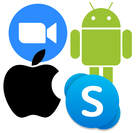Remote Recording7/1/2023 Is remote data collection suitable for socio-phonetic analysis? When the Covid-19 pandemic put a halt to in-person data collection, researchers shifted to collecting speech recordings through smartphones and video call apps like Zoom or Skype. This project tested the suitability of such recordings for linguistic research. We've since expanded to organizing workshops and panels on various remote data collection methods. In collaboration with Dr. Paul De Decker of Memorial University in Newfoundland, we compared measurements of vowel spaces, vowel mergers, and vowel nasalization. In short, self-recordings and video calls should be suitable for most remote vowel data collection. Laptops and video call apps made accurate recordings, but small mobile devices like smartphones and iPads added some distortion to frequencies between about 750 Hz and 1500 Hz. If your research question relies on small spectral differences, especially in low or back vowels, pay attention to the hardware your remote participants use (and consider asking them to use a laptop or external microphone rather than a phone or tablet). See our abstract for details. See project and related news here. Papers & Presentations
(*student author)
People & Related Work
Collaborator:
Related Projects:
Student Corner
Data and materials:
Comments are closed.
|

